Search Results
Showing results 1 to 20 of 20
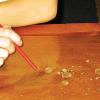
Water Drop Races
Source Institutions
In this activity, learners will explore the physics of liquids and gas by playing with both! Learners of any age use their own breath to move drops of water across a smooth wax paper surface.
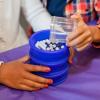
Exploring Size: Ball Sorter
Source Institutions
In this activity, learners use sieves with different-sized holes to sort balls by size.
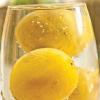
Floating and Sinking Fruits and Veggies
Source Institutions
In this activity, learners will explore the density of an object in water. Learners will compare what happens to fruits and vegetables in regular and salt water.

Exploring Forces: Gravity
Source Institutions
In this nanoscience activity, learners discover that it's easy to pour water out of a regular-sized cup, but not out of a miniature cup.

Convection
Source Institutions
In this activity, learners model atmospheric convection currents using food coloring, water, and clear cups. Activity includes step-by-step instructions, STEM connections, and more.
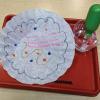
Chromatography Observations
Source Institutions
In this activity, learners will explore how water affects marker on filter paper. Learners will use science process skills such as making observations and predictions as they explore color.
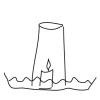
Thirsty Candle
Source Institutions
In this activity, learners will explore the dynamics of air pressure by using a candle, a cup, and a dish of water.

Exploring Earth: Paper Mountains
Source Institutions
In this activity, learners explore in what ways the shape of the land and the pull of gravity influence how water moves over Earth.
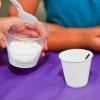
Exploring Materials: Hydrogel
Source Institutions
In this activity, learners discover how a super-absorbing material can be used to move a straw.
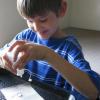
Exploring Products: Nano Fabrics
Source Institutions
In this activity, learners explore how the application of nano-sized "whiskers" can protect clothing from stains.
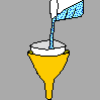
Filtering
Source Institutions
Make a quick and easy filter from household materials. A filter will catch any solids suspended in a liquid and filter them out. By using a filter, learners can discover amazing things.
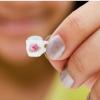
Gravity Fail
Source Institutions
In this activity, learners try pouring water out of a regular cup and a miniature cup. It’s harder than it sounds! Learners discover that different forces dominate at different size scales.

Sock It To Me
Source Institutions
In this activity, learners discover how sweating makes us feel cooler. Learners put on one damp sock and one dry sock and sit in front of a fan.

Ready, Set, Fizz!
Source Institutions
In this activity, learners explore the chemical reaction between water and effervescent antacid tablets. This hands-on activity models how a material can act differently when it's nanometer-sized.
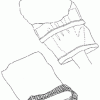
How Animals Stay Warm
Source Institutions
In this quick activity, learners explore how blubber protects animals from the cold by making a "blubber mitt." Using cooking shortening, two zip-top sandwich bags, and duct tape, learners simulate bl

Make Your Own Sea Otter
Source Institutions
In this activity about sea otters, learners make their own "otter whiskers" and use them to find objects underwater.

Remote Control Roller: Experiment with Static Electricity
Source Institutions
This activity is an investigation of static electricity. What happens when you get "static cling?" Basically, you pile up electrons on one thing, which attracts the protons in something else.
Size Them Up: Learning About Volume and Capacity
Source Institutions
In this activity, learners will put a set of containers in order by capacity. Would the tallest container hold more or less water than the wide, short one?

Exploring Earth: Investigating Clouds
Source Institutions
“Exploring Earth: Investigating Clouds” is a hands-on activity in which visitors create a cloud in a bottle and explore it with laser light.
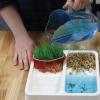
Exploring Earth: Land Cover
Source Institutions
This activity models some of the ways natural processes, such as erosion and sediment pollution, affect Earth’s landscape.
